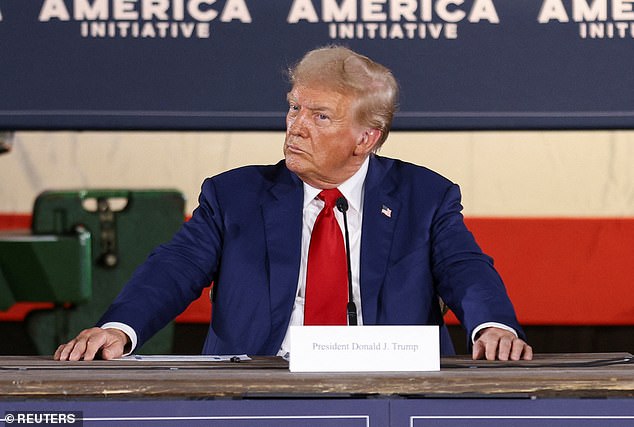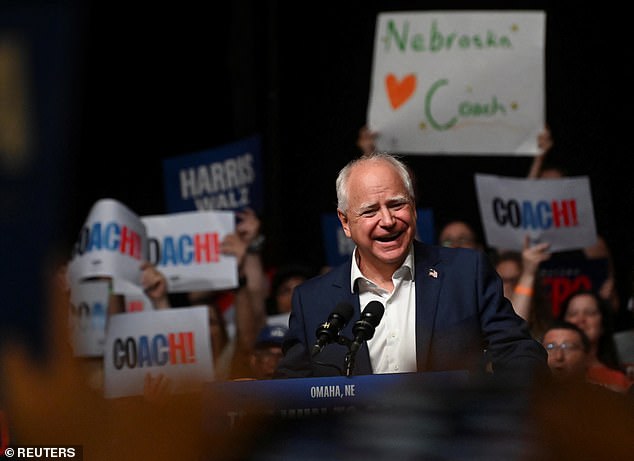Donald Trump allies face surprise setback as they seek to change election laws in a state that could decide the 2024 race
Former President Donald Trump’s closest allies faced a major problem Monday in their efforts to change the way electoral votes are distributed in Nebraska, after Republican Sen. Mike McDonnell announced his opposition to the measure.
The effort was part of an attempt to help the ex-president on his path to 270 electoral votes as the race for the White House could be one of the closest events in American history.
But without McDonnell’s support, it is virtually impossible to change the law.
“After careful consideration, it is clear to me that now, 43 days before Election Day, is not the right time to make this change,” McDonnell said in a statement.
“I have informed Governor Pillen that I will not change my long-standing position and that I will oppose any attempt to change our electoral college system prior to the 2024 elections,” he continued.
Nebraska Republican Senator Mike McDonnell has announced his opposition to changing the state’s election law to a winner-take-all system, making it nearly impossible for Republicans to implement the change before the 2024 election.
Since 1992, Nebraska is one of two states that allocates electoral votes proportionally, with a portion of the vote also distributed by congressional district. The other state is Maine.
While Trump won Nebraska by nearly 20 points in 2020, Biden flipped the 2nd District from Omaha and captured his only elector, giving him 306 electoral votes in the last presidential election.
In 2024, the election is expected to be even more exciting between Trump and Vice President Kamala Harris.
Earlier this month, Republican Gov. Jim Pillen announced that he would call a special session to turn Nebraska into a winner-takes-all state if he could get a clear public signal that 33 senators would support it.
Pillen was the first to say he supports changing the way Nebraska distributes its electoral votes this spring.

Former President Trump has called for Nebraska to move to a winner-take-all system of elections. President Biden received one electoral vote from the state’s 2nd congressional district in 2020
But Republicans would need 33 GOP votes to overcome the filibuster in the state legislature. It currently has 33 Republicans, 15 Democrats and one nonpartisan legislator, so McDonnell’s support was crucial.
Instead, the state legislature said it would encourage the governor and his colleagues to introduce a constitutional amendment during next year’s session that would allow Nebraskans to vote on the matter at the ballot box.
“This November, Nebraskans will have the opportunity to elect candidates at every level who reflect their views, including on this issue. That’s how it should be. Nebraska voters, not politicians from either party, should have the final say in how we elect a president,” he said in his statement.
This move comes as all members of Nebraska’s congressional delegation, all Republicans, support moving to a winner-take-all electoral system.
In addition, Republican Senator Lindsey Graham of South Carolina openly advocated for this move on NBC’s “Meet the Press” program on Sunday.
“I think Nebraska has been talking about this for years. It’s a very close election,” Graham said.
“For my friends in Nebraska, that one electoral vote could make the difference between Harris being president or not, and she is a disaster for Nebraska and the world,” he said.

Democratic vice presidential candidate Tim Walz at a campaign rally in Omaha, NE on August 17, 2024. Walz grew up in the state
Democrats have set their sights on the sole electors from Nebraska’s 2nd Congressional District as part of their surest route to 270 electoral votes.
Harris’ running mate Tim Walz, who grew up in Nebraska, campaigned in Omaha last month.
Even if Harris were to win Pennsylvania, Michigan and Wisconsin, without the opportunity to pick up the electoral votes from Nebraska’s 2nd Congressional District, Harris would fall short by just 269 electoral votes, depriving her of one of the clearest paths to victory.
That scenario could also result in a tie in the Electoral College, with each candidate receiving 269 votes if Trump wins Arizona, Georgia, Nevada and North Carolina. The presidential election would then end up in the Republican-controlled House of Representatives.
